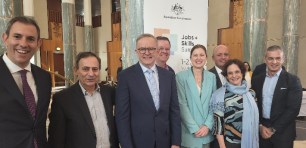
Reserve Bank governor Philip Lowe.
The Reserve Bank of Australia (RBA) has declared that it will increase the cash rate target for a fifth time by 50 basis points to 2.35%, following its monthly meeting this afternoon.
The RBA also announced today that it would increase the interest rate on exchange settlement balances by 50 basis points to 2.25%.
Since May 2022, the RBA has increased the cash rate target by 225 basis points.
RBA governor Philip Lowe says the bank’s board is committed to returning inflation to the 2-3% range over time.
“It is seeking to do this while keeping the economy on an even keel,” he said.
“The path to achieving this balance is a narrow one and clouded in uncertainty, not least because of global developments. The outlook for global economic growth has deteriorated due to pressures on real incomes from high inflation, the tightening of monetary policy in most countries, Russia’s invasion of Ukraine, and the COVID-19 containment measures and other policy challenges in China.
“The further increase in interest rates today will help bring inflation back to target and create a more sustainable balance of demand and supply in the Australian economy.
“Price stability is a prerequisite for a strong economy and a sustained period of full employment.”
Inflation in Australia is the highest it has been since the early 1990s and is expected to increase further over the months ahead, with the RBA stating that global factors explain much of the increase in inflation, but domestic factors are also playing a role.
There are widespread upward pressures on prices from strong demand, a tight labour market and capacity constraints in some sectors of the economy.
CreditorWatch chief economist Anneke Thompson says the RBA was not shying away from its goal of bringing inflation back inside the target band.
“Retail trade, labour force and business sentiment data all point to continued ‘heat’ in the economy, even though consumer sentiment and house prices continue to weaken,” he said.
“We expect that the RBA will not hit the pause button on cash rate increases until retail trade data starts to better reflect downbeat consumer sentiment. This could happen, however, as soon as the upcoming Christmas shopping period. It is likely by December that mortgage holders will be really feeling the effects of higher repayments, and of course higher prices of everything from furniture, to eating out and to holidays.
“However, increasing the complexity for the RBA is the record low unemployment rate. NAB’s Business Conditions survey shows that businesses are operating at record capacity, which is a very good leading indicator of unemployment.”
Handpicked for you

Working from home isn’t tanking the economy, no matter what the ‘back to work’ brigade have to say



COMMENTS
SmartCompany is committed to hosting lively discussions. Help us keep the conversation useful, interesting and welcoming. We aim to publish comments quickly in the interest of promoting robust conversation, but we’re a small team and we deploy filters to protect against legal risk. Occasionally your comment may be held up while it is being reviewed, but we’re working as fast as we can to keep the conversation rolling.
The SmartCompany comment section is members-only content. Please subscribe to leave a comment.
The SmartCompany comment section is members-only content. Please login to leave a comment.